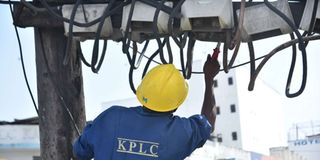
Kenya Power offices on Aga Khan Walk in Nairobi.
The High Court has declared that it has jurisdiction to examine the constitutionality of Kenya Power’s unilateral and arbitrary disconnection of electricity to essential institutions such as hospitals run by county governments over pending bills.
Mombasa High Court Judge Jairus Ngaah made the declaration while dismissing an objection filed by the electricity company in a case seeking to stop it from disconnecting power to public facilities offering essential services due to unpaid electricity debts.
The judge ruled that the court has jurisdiction to hear and determine the case, despite the existence of the Energy Act, which requires that such disputes be referred to the Energy and Petroleum Regulatory Authority (Epra) before court intervention is sought.
“There would be nothing wrong with the petition to the extent that the petitioner is seeking the court to interrogate the constitutionality of Kenya power’s unilateral and rather arbitrary acts of disconnection of electricity to county governments’ offices and other facilities run by the county, such as hospitals, because of pending electricity bills or because of disputes as to whether such bills are pending in the first place,” said the judge in a ruling dated June 27.
Justice Ngaah noted that while the Energy Act may prevail in the event of a conflict with any other law, it cannot override the Constitution particularly the provisions that authorise the High Court to interrogate the constitutionality of any action by KPLC, even if taken under the authority of the Energy Act or the Constitution itself.
Section 161(2) of the Energy Act, 2019, places the government, its agencies and county governments in a special category of electricity consumers.
According to this provision, whenever any of these entities has a pending electricity bill, the firm is required to report the debt to the Cabinet Secretary for the National Treasury, who must then report the same to Parliament for necessary appropriation.

A Kenya Power employee carries out repairs on Haile Selassie Road, Mombasa.
“In the wake of this provision of the law, this court is entitled to interrogate the constitutionality of KPLC’s actions of disconnecting power from county governments’ facilities ostensibly because the devolved units’ electricity bills have not been settled,” said the judge.
Justice Ngaah, therefore, declared that he was satisfied the petition was properly before his court and dismissed Kenya Power’s preliminary objection. This ruling paves the way for the case to proceed, with the court expected to determine whether the utility firm has the authority to arbitrarily disconnect electricity to essential institutions due to unpaid bills.
The power company had asked the court to dismiss the case filed by Mombasa resident Charles Waithaka Rubia. Through Lynno Owano Advocates, the firm argued that the High Court lacked jurisdiction to hear and determine the dispute.
“The respondent, therefore, asks the court to strike out both the petition and the notice of motion dated February 28, 2025, along with all consequential orders sought by the petitioner,” said the company.
According to the company, the case contravenes several provisions of the Energy Act, 2019, the regulations on Complaints and Disputes Resolution, the Energy Tribunal Rules, 2008 and the Constitution, which emphasizes alternative dispute resolution mechanisms.
“The petitioner has failed to exhaust the available statutory mechanisms before approaching the court,” the company argued, adding that the High Court’s jurisdiction in such disputes is appellate in nature, as stipulated under the Energy Act, 2019.
The power distributor insisted that the dispute should first be addressed through the appropriate dispute resolution mechanisms established under the Energy Act before being escalated to the courts.
Mr Rubia filed the case earlier this year, arguing that disconnecting power to vital facilities has previously disrupted essential services and put lives at risk. He seeks urgent intervention from the court to prevent further harm.
Through Mogaka Elkana Advocates, the petitioner argued that the company abused its authority when it arbitrarily cut off the power supply to Nairobi County in February, violating the public's fundamental rights.
“The actions by the respondents amount to economic sabotage and an unconstitutional attempt to paralyze the operations of the county, which is responsible for providing essential public services,” said Mr Rubia.
In February, Kenya Power disconnected electricity to several Nairobi County offices, citing unpaid bills amounting to billions of shillings. In response, the devolved unit dumped heaps of garbage at the entrances of KPLC’s headquarters, Stima Plaza, disrupting operations and forcing staff to vacate due to the foul smell.

Nairobi Governor Johnson Sakaja.
While filing the petition, Mr Rubia accused KPLC of failing to engage in legally recognised dispute resolution mechanisms such as arbitration and mediation, instead resorting to intimidation and coercion.
“There exists no justifiable reason for KPLC to unilaterally, arbitrarily, and oppressively disconnect power supply to the county, especially when the affected services are of national and public importance,” the petition reads.
The petitioner warned that such actions set a dangerous precedent in which county governments could be unlawfully coerced and bullied by national agencies, undermining the constitutional framework governing intergovernmental relations.
In his court documents, the petitioner is seeking a declaration that KPLC’s actions, when taken without exhausting the dispute resolution mechanisms provided under the Intergovernmental Relations Act, are unconstitutional.
He also seeks an order compelling KPLC to submit its payment dispute with Nairobi County to the appropriate dispute resolution mechanisms, as stipulated in national legislation.
Mr Rubia has named Energy Cabinet Secretary Opiyo Wandayi and the Attorney General as respondents in the case, while the Council of Governors and Nairobi County Government are listed as interested parties.
He has cited past incidents—such as those at Kisumu District Hospital in 2014, Coast General Teaching and Referral Hospital in 2023, and facilities in Homa Bay, Busia, and Migori—where KPLC disconnected electricity due to unpaid bills, arguing that such actions put the lives of patients at risk.






